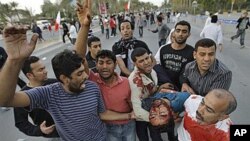Bahrain’s main hospital has been flooded with patients after security forces opened fire on anti-government demonstrators. Fifty-five people are reported injured, seven of them are said to be in critical condition. Witnesses said the demonstrators were performing Friday prayers at Manama’s Pearl Roundabout when shots began to ring out.
The violence was at the same site where riot police killed four people earlier in the week. Medical officials say it appears real bullets were used in Friday’s attack.
Sharif al-Hamid was at the scene and had to be hospitalized for severe teargas inhalation. "200 people or 300 people came to pray. They started prayer and they (authorities) started shooting," he said.
As of midnight on Friday, no deaths had been confirmed. Dr. Jafa Abdullah estimated, however, that at least 50 people were rushed to Salmaniya hospital for treatment, and he said the military made it difficult for the injured to get help.
"We have information that five to six persons from paramedics were almost arrested there by the police force and they are not allowing them to transport the patients and not allowing them to even come back for us," said Abdullah. "At least, we are waiting for the authorities to open the area for us to go and help the injured people there and transfer them to here to support their needs."
|
Protests continued Friday across the Middle East and North Africa
|
A nurse at the hospital, who asked not to be named, said that the situation in Bahrain has gotten out of control and she called on Western Powers to do more to help. "We are dying here. They are killing people. Really we cannot tolerate this."
News of the latest crackdown prompted hundreds of protestors to gather outside the emergency room at Salmaniya hospital and begin chanting anti-government slogans.
A Special Forces police officer also showed up and announced his resignation. He said he refused to be part of an organization that killed innocent people.
Since peaceful protests began in Bahrain on February 14, five people have been confirmed dead. Human rights groups reported 60 people have gone missing.
Bahrain’s foreign minister, Sheikh Khalid bin Ahmed Khalifa, has defended the country’s use of force, saying it was necessary because demonstrators were pushing the country to the brink of a sectarian abyss”
Shi’ite Muslims make up roughly two-thirds of Bahrain’s population and say they are not given the same social benefits as the country’s Sunni minority. They also accuse the government of naturalizing foreign Sunnis and giving them the top jobs in the country.
Bahrain’s crown prince, Salman bin Hamad al-Khalifa, called for calm on Friday, saying it was time for dialogue, not fighting.
Slideshow of today's protests




